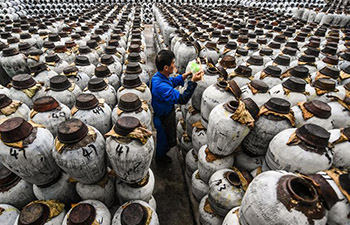KUNMING, Nov. 7 (Xinhua) -- In Xizhou, a small town in southwest China's Yunnan Province, workers use chopsticks to move curds making rushan, a kind of cheese, while visitors look on.
The Linden Center is run by Brian Linden, an American. Visitors from China and abroad can get to know the Bai people, who make up the majority of the local populace.
"Even though I am a foreigner, I have always dreamed of finding a way to learn, share and discover Chinese culture," Linden said. "The Linden Center allows me to do just that."
The center helps preserve local traditions such as the Torch Festival and the Rice Transplanting Festival.
Linden's journey in China started in 1984 when he was a carpet cleaner in the United States before a friend invited him to China, where he played several roles in films, worked as a photographer, and traveled widely.
He returned to the United States and, in 2004, sold his house, and brought his wife and two sons back to China to embark on a two-year odyssey across the country.
"My sons needed to study, so hotels and trains became classrooms," Linden said.
When train tickets were hard to come by, they bought standing-room-only tickets, he said.
"We just wanted to show the kids how important it is to chase dreams and how their parents can make their dreams come true."
From the northwest to the far south, the Linden family voted whether to stay in any given place or move on and eventually settled in Xizhou. The town is close to Erhai Lake and Cang Mountain, making it a "land of idyllic beauty," as Chinese writer Lao She put it in his book about Yunnan.
What captured Linden's attention in Xizhou was the Yang family compound, a building with the distinctive features of Bai architecture. It was built in 1948 and put under nationally protection in 2001. Linden wanted to turn the compound into a boutique hotel and after four years of negotiations with the local government, he was given permission.
Instead of using a professional architect, the Lindens decided to renovate the building themselves.
"Just the cost of fire safety measures and rewiring exceeded one million yuan (151,000 U.S. dollars)," Linden said.
During the renovation, he spent half his time at the construction site, and the other half in the village, talking to people, making friends and explaining what he was doing.
"If the Linden Center really wants to be part of Xizhou, the support of local people is very important," he said.
About 100 people were involved in the renovation and the center now employs about 50.
"We could keep the ball rolling with just half of them actually, but I want to help local employment," he said.
In 2008, after almost nine months of work, the Linden Center opened with the structure of the original compound and delicate wood carvings intact.
From the very beginning, the center was more of a place of cultural exchange than just a hotel. When it opened, Linden invited dozens of foreign painters to work there.
Years later, the center has evolved into five big courtyards, and 16 guests rooms. Besides accommodation and catering, visitors can take part in all kinds of cultural activities, textile dyeing and cookery lessons.
One of the courtyards has become a place of education, receiving student groups from around the world. He has set up connections with Yale, Stanford and China's Fudan University.
"In the Linden Center, I have found my way to learn, share and explore Chinese culture," Linden said.

















